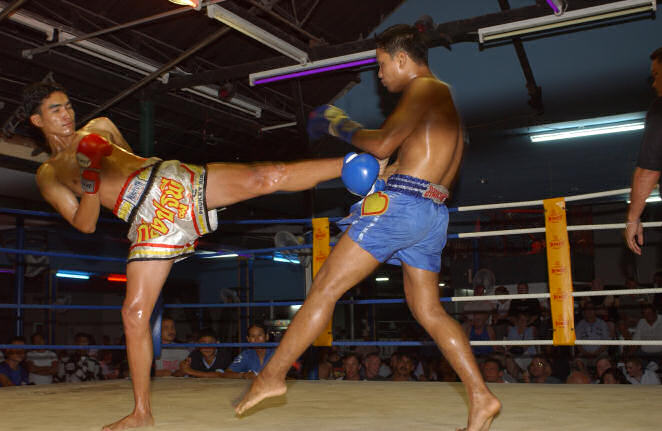|
Now
if one watches enough movies and believes what he watches, he’s
probably going to give the nod to the Martial Arts expert who's been schooled
in one of the exotic Martial Arts disciplines, and certainly not
plain ordinary boxing. Why?
Because it seems different, and more sensational than boxing. On screen all those kicks and strange hand blows simply look
prettier or at least more sophisticated.
Now, I’ve had my own ideas
on the subject, from the time I was about ten years old. Provided
the boxer has good strength, speed, and punching power, he’s going
to kick the martial arts expert’s ass provided the two fighters are
of roughly equivalent physical ability–or at least that’s my
opinion. I’ve always felt that Martial Arts has gained
popularity and notoriety for the following reasons–1. It appears
more spectacular in the movies and on television, 2. The concept of
a weak person (eg. A small female against a large male) overcoming a
much larger and stronger opponent is alluring (particularly to those
not gifted with size and strength or speed), 3. It is both
portrayed and advertised as being more scientific. and 4. So called exotic
forms of martial arts training sells lots of martial arts classes
and equipment with lengthy curriculums that oftentimes lasts for years. But a
lot of people have disagreed with me. But now, thanks to my recently
having moved to Thailand I have some rather outstanding visual
evidence that support my theories in the form of a video in which three Thai Muay-Thai boxers faced three Western boxers. Actually there were
four Western boxers against four Thais, but I never got one of the
fights in the video because this particular fight only lasted a few
seconds and because I was busy getting digital stills of the action
before I had the chance to get the camcorder into action. So bear
with me as I give you the reasons why I believe boxing is superior
to the other martial arts, then watch the video.
The Grandpa Timmerman Days
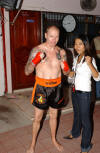 Staunton,
Illinois where I grew up was a tough town. A few years before I had been born
Staunton was having its heyday when the coal mining had reached its peak , numbering over
7000 residents. Most of the residents came from families that had emigrated
from Europe, many having come over the pond from places like Poland,
Czechoslovakia, and Hungary which had provided the source for their Slavic
names. From the time I was in the First Grade it seemed I was always fighting.
My first grade nemesis was a bigger boy named Henry Porter Lloyd. Henry had a
small gang of boys as followers. I’d wind up beating up all the boys in his gang
only to wind up having to face Henry who’d then blacken both of my
eyes. But by the Second Grade I could usually take Henry, but in the Third
Grade he’d wind up beating me again. Henry was tough–tough enough to wind up
being a Green Beret and finishing three tours of duty in Vietnam. Staunton,
Illinois where I grew up was a tough town. A few years before I had been born
Staunton was having its heyday when the coal mining had reached its peak , numbering over
7000 residents. Most of the residents came from families that had emigrated
from Europe, many having come over the pond from places like Poland,
Czechoslovakia, and Hungary which had provided the source for their Slavic
names. From the time I was in the First Grade it seemed I was always fighting.
My first grade nemesis was a bigger boy named Henry Porter Lloyd. Henry had a
small gang of boys as followers. I’d wind up beating up all the boys in his gang
only to wind up having to face Henry who’d then blacken both of my
eyes. But by the Second Grade I could usually take Henry, but in the Third
Grade he’d wind up beating me again. Henry was tough–tough enough to wind up
being a Green Beret and finishing three tours of duty in Vietnam.
My second nemesis was Sanford Bloemaker. I
don't think Sanford ever was more than about five foot six, but he was two years
older than me. And when you are only twelve or thirteen those couple of
years can mean an awful lot. Sanford loved to take on anyone foolish
enough to put the gloves on with him in our Junior High PE classes. By
then I was very fast with my hands, but Sanford was in a class by himself.
And he was extremely coordinated. I'd often tease Sanford who after having
enough would beat the snot out of me. Back in our Junior High no one could beat
Sanford. Years later he'd serve as a tunnel rat in the Vietnam War.
But Henry and Sanford's fighting
prowess would soon pale compared to other Staunton boys. The
man who would teach them how to fight was my Timmerman.
I met my Grandpa Timmerman when I was ten. That was the year he married my
Grandmother on my father’s side. George Timmerman was superintendent of the
Staunton Coal Mine. He was seventy when he married my grandmother. One of the
first things he did was to take our family on a tour of the mine on
one of those little underground trains I never got to ride on again. The second
thing I remember him doing was knocking my Dad down twice in succession
in just a few seconds after the pair put the gloves on in our basement.
My Grandpa Timmerman had just installed a platform bag setup and heavy
bag in our basement. Now my Dad was no sissy, and from what I have heard about
him, he won most of his fights as a boy or young man. He was a Captain in the
Army during World War II, and people who knew him best said, he never was afraid
of anybody. But George Timmerman at seventy could keep a speed bag moving at a
high speed blur using just his elbows. Dad who was twenty-five years younger,
could not begin to match Grandpa Timmerman’s speed. I don’t think he landed a
single blow.
Grandpa Timmerman used to be an amateur boxer
who fought in a number of unpaid matches. Part of his training was to box a few rounds with
his friends after which he would run eighteen miles. He had also served a few times
as a referee for both professional boxing and wrestling matches. In his day he
knew quite a few professional fighters and even knew a champion or two.
He had a gym in his basement. It included a platform bag setup just like mine
and a heavy bag along with a few interesting gadgets such as a short segment out
of a broom handle to which he had tied a rope to which he had tied a twenty
pound weight on the other end. Its purpose was to build up forearm strength by
twirling the broom handle in both hands which would wrap the rope around it
while he pulled the weight up. His house was modest in size and simple inside. He
had old furniture in his living room but that really didn’t matter because what
he did have was a collection of books on boxing and Ring Magazines and of even
greater
importance, he had the knowledge and the boxing skills that he was all too
willing to
share with others.
 I’d
wind up spending an hour each day working out on his punching bags; then
I'd run five miles as summer training for my college cross country
running team. But that was
after I was nineteen, and by that time there were plenty of other young men
visiting Grandpa’s gym. When I was nineteen I had breathing problems from my
nose, and after having the serrated septum operation that took care of the
problem I felt weak as a kitten. I had a date with one of the most beautiful
girls I had ever seen and ended up walking her through a bad area in St. Louis
after a ball game. I felt very vulnerable because I was too weak to defend
her if a troublemaker should suddenly surface. So as soon as I felt strong enough I
started working out for the College Cross Country running team and putting
in that hour of boxing time. I’d
wind up spending an hour each day working out on his punching bags; then
I'd run five miles as summer training for my college cross country
running team. But that was
after I was nineteen, and by that time there were plenty of other young men
visiting Grandpa’s gym. When I was nineteen I had breathing problems from my
nose, and after having the serrated septum operation that took care of the
problem I felt weak as a kitten. I had a date with one of the most beautiful
girls I had ever seen and ended up walking her through a bad area in St. Louis
after a ball game. I felt very vulnerable because I was too weak to defend
her if a troublemaker should suddenly surface. So as soon as I felt strong enough I
started working out for the College Cross Country running team and putting
in that hour of boxing time.
I got good enough to be able to spin the speed bag
with my elbows although I never got as fast on it as Grandpa Timmerman. And the
heavy bag workouts doubled my punching power. At that time I felt I could
deliver a punch to the point of a man’s jaw or chin quickly and
accuracy with the force of a baseball bat. Just imagine having heavy
baseball bats for arms and being able to unleash their power
in a microsecond at your opponent's left or right eye.
I cannot begin to describe that feeling.
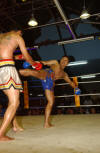 I
was afraid of nothing. But I was not even close to being as good with my fists
as some of the young guys from Staunton Grandpa had in his gym. Grandpa once told me of a top ranked
professional prize fighter he had in his basement once. Present also were a couple
of good Staunton amateur boxers. The prize fighter was holding a little child in his
arms and while holding the child he dared one of the amateur boxers to try to
hit him in the head. The young amateur boxer tried and while he tried the
professional just started twisting his head back and forth to one side or the
other or pulling it backwards, which made the young man appear as if he was
punching at shadows because not once was he able to land a single punch. I
was afraid of nothing. But I was not even close to being as good with my fists
as some of the young guys from Staunton Grandpa had in his gym. Grandpa once told me of a top ranked
professional prize fighter he had in his basement once. Present also were a couple
of good Staunton amateur boxers. The prize fighter was holding a little child in his
arms and while holding the child he dared one of the amateur boxers to try to
hit him in the head. The young amateur boxer tried and while he tried the
professional just started twisting his head back and forth to one side or the
other or pulling it backwards, which made the young man appear as if he was
punching at shadows because not once was he able to land a single punch.
I fought on the playground or the streets often between the ages of ten and
fourteen and I won most of my fights . Except for when I fought Sanford. I was pretty quick for one thing and had
learned the basic boxing skills from Grandpa and working out on the
punching bags. But I also had the gift of being able to put the other kid down.
 Practice ring behind the main ring with heavy training punching bags in the
background Practice ring behind the main ring with heavy training punching bags in the
background
While getting to know my step grandfather I started following the upcoming
professional heavy weight match between the champion, Floyd Patterson and Sonny
Liston. It was around then that Grandpa took me to a professional boxing match
in St. Louis. While watching that fight I noticed a grim looking muscular black
man sitting behind me. The man never smiled. He was terrifying. It was
Sonny Liston.
“Liston will kill Patterson,” grandpa predicted. Which is exactly what happened.
Patterson who weighed 190 or so was going up against a man thirty pounds heavier
at around 220, a man who had developed a formidable reputation as a crunching
puncher.
 The bar complex surrounding the main boxing ring here in Pattaya The bar complex surrounding the main boxing ring here in Pattaya
Grandpa never had much use for a boxer who
couldn’t punch very hard. He told me about Jack Dempsey, telling me that at less
than 190 pounds, Dempsey’s fighting weight while in his prime, Dempsey could
take a man out with a short punch measuring no more than 6 inches no matter
what the man’s size.
 His
favorite of them all was Joe Louis, another heavyweight champion who could punch
a man out with a single punch that measured no more than six inches. But
Louis was also the supreme boxer, a man who possessed all the skills of the
ring, hitting power, defensive prowess, speed, and finesse. His
favorite of them all was Joe Louis, another heavyweight champion who could punch
a man out with a single punch that measured no more than six inches. But
Louis was also the supreme boxer, a man who possessed all the skills of the
ring, hitting power, defensive prowess, speed, and finesse.
He never seemed to think much of Muhammed Ali and that was because he didn’t
think Ali could punch with the best of them. But Grandpa Timmerman died before
Ali really hit his stride.
Back when I was a kid, I was nearly taken in by all the magazine ads making
exaggerated claims of Karate. I nearly signed up for mail orderMartial
Arts courses that would in just a few hours make an unholy killer out
of me.
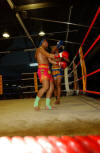 So
I asked Grandpa what he thought about Karate and other Martial Arts. And Grandpa
would just scoff and say that a good street fighter would cream any Karate
expert in the world. Then he told me: “Look, all that karate and kicking is
no good. The shortest distance between two points is between a man’s fist and
the other man’s head. Dempsey would knock a man’s head clean off with a punch he
could deliver 6 inches from the guy's head. So
I asked Grandpa what he thought about Karate and other Martial Arts. And Grandpa
would just scoff and say that a good street fighter would cream any Karate
expert in the world. Then he told me: “Look, all that karate and kicking is
no good. The shortest distance between two points is between a man’s fist and
the other man’s head. Dempsey would knock a man’s head clean off with a punch he
could deliver 6 inches from the guy's head.
He also told me that a good wrestler would get in close to the Martial Arts
expert, and that once he had grappled with him it would be all over.
He then showed me a maneuver by which I would place
my hand on my opponent's head while
I placed my foot and leg behind his body as I shoved the
man's head backwards. “See. If
you are fighting far away and he moves in on you just do this. Once you got him
he’s got to go down. There is nothing he can do except try to protect himself.
He can’t kick or punch you or do anything.”
Later I used that simple manuever
in a real street fight
in my Junior year
of College. I didn't want to fight the other guy after
I had been shoved out the bar's entrance by several members
of the football team. As I tried to walk back into the
door, my attacker punched me so hard that the blow broke my
eardrum. I let into him and drove him back a few feet
with a floury of punches, but he didn't go down.
Outweighing me by thirty or forty pounds he tried to get in
close, and then I sprung the simple maneuver on him.
He went down with me on top of him. Then I started to
pound his head into the concrete sidewalk with every
intention of killing him. But the police came and his
football pals pulled me off of him.
All the Martial Arts training in
the world would not have stopped my
eardrum from being pierced.
And nothing short of the quick reactions of the police and
his pals would have saved him from getting his head
shattered against the sidewalk.
******
It seems all the guys who could fight wound up down at Grandpa’s gym at one time
or the other. But by the time I was 19 I was nearly five hundred miles away–in
college. I’d work out there during the summers but somehow I missed out on
meeting and working out with the best boxers from the area.
My grandfather told me about a guy named Myron Spencer who was around six foot two and two
hundred pounds. Myron could have cleaned up in the Illinois Golden Gloves,
Grandpa told me, but for some reason Myron didn’t stay serious long
enough. But I heard about a couple street fights Myron got into. During one of
them he knocked out two adversaries who had doubled up on him. From what I had
been told, Myron had wondrous speed and the punching power to take
practically anyone off his feet with a single punch.
I finally met Myron just five months ago. Both of us were fifty-eight. We met at
the Staunton Class of 1965 reunion. And Myron looked in great shape at 58,
and still able to more than hold his own. I also ran into Sanford Bloemaker
at the reunion and I asked him who was the toughest kid he knew during his late
teens after I had moved away from Staunton. Without hesitation Sanford
told me Myron Spencer was the finest boxer he ever knew. "He was at least
as fast as me," said Sanford, "but he was over two hundred pounds and much
taller, and he could really punch." But from what I could see of Myron at
the class reunion reminded me of Gary Cooper, the
movie actor, Myron being quiet spoken and not the sort to start a fight with anyone.
But Staunton was a tough town then. As a boy you learned to fight
and you fought often.
For a short period of time they had Golden Gloves boxing matches in Springfield,
Illinois. It only lasted a couple of months and I was around forty by then. But
I do remember two fighters pretty well. They were light heavy weights. Around
170 pounds or so. One was a very quick black boxer with a great jab. The other
was a Hispanic, but he looked Caucasian to me. The black fighter was showing off
his considerable skills, coming off as the far flashier of the two. But the
Hispanic guy held his ground as he coolly stalked his flashy opponent across the
ring. In spite of all his speed the black fighter never landed a single
telling blow on the Hispanic. After a few minutes the stalk was over when the
Hispanic fighter caught up with the speedster and leveled him. Later I found out
the Hispanic was one of the best golden gloves fighters in the nation.
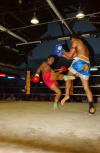 I
saw him again, this time against another fighter. The pair got in close to each
other at times as they pummeled each other’s bodies. I thought then and there
that not one of the martial arts fighters I had ever seen could have stayed in
there with these two. It was a battle royal in that ring. One never sees it on
t.v. Or in the movies for that matter. Neither medium begins to capture the
speed at which a good boxer’s blows are delivered or the quick little moves of
the head that keep him from being knocked out by his opponent. I
saw him again, this time against another fighter. The pair got in close to each
other at times as they pummeled each other’s bodies. I thought then and there
that not one of the martial arts fighters I had ever seen could have stayed in
there with these two. It was a battle royal in that ring. One never sees it on
t.v. Or in the movies for that matter. Neither medium begins to capture the
speed at which a good boxer’s blows are delivered or the quick little moves of
the head that keep him from being knocked out by his opponent.
And if for some reason all that speed and prowess is not being captured for a
television or movie audience it is not going to sell very well. Believe me,
seeing a couple good fighters box in real life is far different from watching it
on the screen. The difference is as in night and day.
Think about it one more time—the shortest distance to an adversary’s head is
with one’s fist. The foot is simply too far away to begin to match the kind of
speed that can be delivered by the hands at close range. So consider what I am going to say. If a man has good punching power–that
is if he is a legitimate puncher and he has the necessary speed, he has some
serious potential as a boxer. If he doesn’t have both he might as well not even
get started.
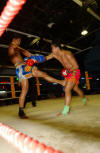 I
think that the Martial Arts is considered by many as the equalizer. That is, if
you are not strong, or not all that fast, that provided you work hard enough at
it, you will somehow emerge as a champion. And perhaps you will. Because it’s a
lot of hard work getting your feet off the ground into a man’s face. A lot
harder than punching with the fist. I
think that the Martial Arts is considered by many as the equalizer. That is, if
you are not strong, or not all that fast, that provided you work hard enough at
it, you will somehow emerge as a champion. And perhaps you will. Because it’s a
lot of hard work getting your feet off the ground into a man’s face. A lot
harder than punching with the fist.
And why is it that in the televised kick boxing matches I’ve watched that
fighters
get considerably more points when they deliver a blow with their feet than with
their fists? It’s because it’s considerably harder to land a punch
on one's opponent with the feet, that’s why. A good puncher does not need his
feet to take the other guy out and the fist provides him with the greatest
chance of ending the fight quickly and efficiently. But that doesn’t sell
tickets, does it? So the fighters are encouraged to do the flashy stuff
audiences like, and audiences love those wonderfully coordinated round house
kicks flying through the air.
The Boxing Videos
Let’s now see if I’m right. If common sense does
not persuade you, basic empirical evidence certainly should.
 The
first video footage shows two Thai boys parrying off. One thing I’ve noticed
about how the U.S. differs from Thailand and most European countries is in the
U.S. there is far more emphasis on the hands than the foot in sports. Soccer is
not big in the U.S., but it is in England, France, Germany and in Thailand. In
the U.S. football is a misnomer because it is a player’s prowess with his hands
that counts–in passing the ball for example, handing off, etc. Or with the
shoulders and arms--blocking by linemen for example. And in boxing all
the blows come from the hands, not the feet. Even in basketball, basic hand eye
coordination rules. The
first video footage shows two Thai boys parrying off. One thing I’ve noticed
about how the U.S. differs from Thailand and most European countries is in the
U.S. there is far more emphasis on the hands than the foot in sports. Soccer is
not big in the U.S., but it is in England, France, Germany and in Thailand. In
the U.S. football is a misnomer because it is a player’s prowess with his hands
that counts–in passing the ball for example, handing off, etc. Or with the
shoulders and arms--blocking by linemen for example. And in boxing all
the blows come from the hands, not the feet. Even in basketball, basic hand eye
coordination rules.
 But
just watch a bunch of Thai boys out on the playground. The kids are doing a lot
with their feet whether it’s practicing soccer or kick boxing. But in Thailand
the sport of kick boxing is Muay Thai, a blend of boxing with the hands combined
with kicking with a good measure of elbowing thrown in. Many believe that it’s
the addition of blows with the elbows that make Muay Thai more effective than
other forms of kick boxing. Muay Thai was developed for the military by the
military, which is part of the reason so many Thai youths learn it. But
just watch a bunch of Thai boys out on the playground. The kids are doing a lot
with their feet whether it’s practicing soccer or kick boxing. But in Thailand
the sport of kick boxing is Muay Thai, a blend of boxing with the hands combined
with kicking with a good measure of elbowing thrown in. Many believe that it’s
the addition of blows with the elbows that make Muay Thai more effective than
other forms of kick boxing. Muay Thai was developed for the military by the
military, which is part of the reason so many Thai youths learn it.
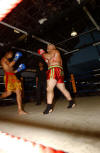 In
the first match shown on the video between adults the Western fighter outweighs
his opponent by a huge margin. The fact that the much larger Caucasian fighter
is easily able to dominate and then knock out his opponent should be no real
surprise to avid students of the ring. History proves that the larger man has a
tremendous advantage over the smaller guy. In
the first match shown on the video between adults the Western fighter outweighs
his opponent by a huge margin. The fact that the much larger Caucasian fighter
is easily able to dominate and then knock out his opponent should be no real
surprise to avid students of the ring. History proves that the larger man has a
tremendous advantage over the smaller guy.
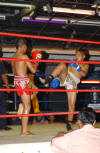 In
championship heavy weight matches there have been quite a number of excellent
light heavy weights–eg. Bob Foster and Billy Conn, but when they moved up to the
heavy weight ranks after outclassing their division, they fell to two legitimate
heavy weights, Joe Louis and Joe Frazer. It is interesting to note that both
Heavy weights were not only two of the best of their era but also legitimate
punchers with a devastating ability to take their opponents out in short order. In
championship heavy weight matches there have been quite a number of excellent
light heavy weights–eg. Bob Foster and Billy Conn, but when they moved up to the
heavy weight ranks after outclassing their division, they fell to two legitimate
heavy weights, Joe Louis and Joe Frazer. It is interesting to note that both
Heavy weights were not only two of the best of their era but also legitimate
punchers with a devastating ability to take their opponents out in short order.
 However,
closer study of the bout on the video shows that when it came to putting away
his opponent the Western fighter relies on the punching power of his arms which
was easily up to the task. The end comes swiftly for the smaller man. It is as
if he has run into an earthquake. Do keep in mind, however, that I
clearly have the advantage over those who are watching the video on
You Tube. While editing this video I could run the
footage in slow motion. I could also run it one frame at a
time so I could tell exactly how a man went down and what type of
punch delivered the final blow. However,
closer study of the bout on the video shows that when it came to putting away
his opponent the Western fighter relies on the punching power of his arms which
was easily up to the task. The end comes swiftly for the smaller man. It is as
if he has run into an earthquake. Do keep in mind, however, that I
clearly have the advantage over those who are watching the video on
You Tube. While editing this video I could run the
footage in slow motion. I could also run it one frame at a
time so I could tell exactly how a man went down and what type of
punch delivered the final blow.
This particular falang or Westerner is a legitimate heavy weight with good hand
and eye coordination. He is able to land his punches consistently which are
powerful enough to literally take a man off his feet.
In the first knockdown, the Westerner uses his hands to deliver a flurry of
punches that ultimately takes his opponent down after two or three seconds. His
Thai opponent is kept off balance during this series of blows which sets him up
for the one that takes him off his feet. In the second knockdown the Westerner
delivers a solid kick as he almost simultaneously lands a quick punch to the
head. It is this punch to the head that knocks the Thai boxer down. The final
knockdown is accomplished in much of the same way. Although a kick is landed it
is the fist that is decisive. A solid shot to the right side of the Thai’s head
from the larger fighter’s left hand is the punch that ends it.
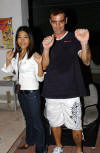
The second Westerner to fight a Thai boxer in the video
In the 2nd fight that pits Westerner against Thai
the two men are pretty much evenly matched. The Westerner appears to me to be a
Middleweight at between 160 and 170 pounds. Unlike the first Westerner, this man
does not seem to me to be a devastating puncher. But his technique is good. But
so is his Thai opponent’s who is about the same size.
The Westerner tries a few blows with his feet which are easily avoided by the
Thai fighter who is simply too quick to be successfully knocked about by the
other man’s legs. Towards the end of the fight the Thai fighter takes the
offensive. Interestingly enough he goes after the Westerner with his hands, not
his feet. But he’s quickly knocked out when he runs right into his opponent’s
right hand. The end is quick. Up to this point both men seem evenly matched.
What I noticed on this video to this point is that the hand to head punches from
both Westerners are so quick that they can barely be seen on the video. For
instance in the first fight, in the final knockdown the Westerner lands a kick
but in much less than a second later he flashes his left hand at the Thai
boxer’s head. I had to advance the video frame by frame in order to determine
which punch put the Thai boxer down. It is right after the Westerner’s left hand
connects with the Thai’s face that the Thai boxer starts to go down, but not
away from the kick. The direction of his descent to the canvas is directly away
from the flow that had just connected to the right side of his head from the
Westerner’s left hand.
The video which I outputted at 30 frames a second was nearly not fast enough to
catch this. This substantiates my theory about traditional boxing matches to be
much more exciting to watch in person. Video is often not fast enough to
accurately depict the action. But it’s definitely quick enough to capture the
much slower punches with the feet. The camera picks up the arc in a fighter’s
legs and then it records the instant of contact. Unfortunately it’s simply not
up to doing as good of a job with the much faster hand to head punches.
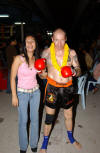
The Western boxer not shown in the video with Spicy
There is a fourth fight that is not on the video.
Over in about thirty seconds I was too busy getting good digital stills with my
Nikon D-1 X to have a chance at getting any video of this fight. However, the
Westerner easily won, and like the other Westerners he got the job done by a KO
with his hands, not his feet.
 In
the final fight the Western and Thai boxers definitely seem to be equal in
weight. What is very conspicuous about this fight it that neither boxer manages
to land a single kick to his opponent. I’m sure that after viewing several of
those roundhouse kicks that a few out of the audience gasped while thinking:
“What would have happened if that kick had landed?” But the point is, it didn’t
land. In
the final fight the Western and Thai boxers definitely seem to be equal in
weight. What is very conspicuous about this fight it that neither boxer manages
to land a single kick to his opponent. I’m sure that after viewing several of
those roundhouse kicks that a few out of the audience gasped while thinking:
“What would have happened if that kick had landed?” But the point is, it didn’t
land.
The Thai fighter in particular seems to have given up on kicking his opponent.
So far he has managed to jump away from every kick from the other man or to pull
his head out of the way. So when he goes after the Westerner he goes after the
man in a big way, going all out with his arms and fists to get in the killing
shot. Finally he gets knocked out, his trip to the canvas the result of a
quickly delivered one two punch in which the Westerner quickly delivers a shot
with first one fist before delivering a nearly simultaneous blow with his other
hand.
And so there we have it. Four fights with four Ko’s, with every single knockout
the result of a blow by the hand, not the foot. The knockdown punches in most
cases thrown by the hand are so swift that they fail to be recorded by my video
camera. It is only by putting the video back into the Windows Movie maker in
edit mode that I am actually able to see the landing of some of the knockout
punches when I advance the video footage frame by frame, one frame at a time.
The bottom line is if you are a real fighter, with solid punching ability you
are going to be able to stop your opponent with a single punch to the head. This
punch will oftentimes be delivered in a span that measures just twenty-four
inches, perhaps even less. Good boxers after sufficient training learn how to
avoid most of these blows. So if they can avoid a swift punch that travels
twenty-four inches or less they are going to easily be able to avoid a kick
traveling along a much longer arc. So given two fighters of roughly equal
ability it’s going to be no content. The boxer wins, and it’s best to leave all
that kick boxing for the movies. |
